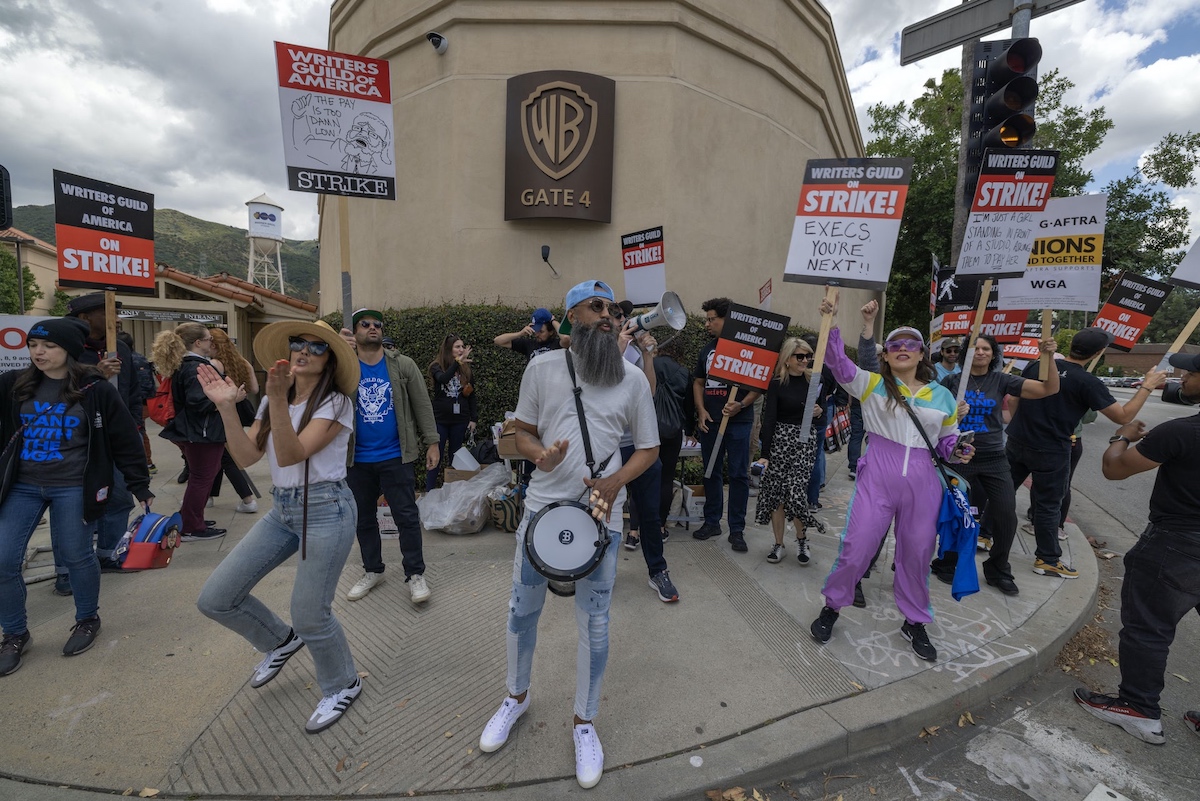The current Hollywood writers strike has drawn international attention to the plight of TV and film writers in the streaming era.
Much has been made of television’s golden age, during which streaming platforms have offered audiences an abundance of well-written, highly produced television shows, often called “prestige TV.”
Whereas older television shows tended to be formulaic sitcoms or crime dramas, newer shows more closely mimic the serialized novels of the 19th century, with cliff-hangers that encourage binge-watching.
But not everyone in the industry has equally reaped the rewards. While there are certainly more writing jobs to go around, these roles often pay less and place writers on short-order contracts.
Furthermore, the unyielding demand for content, as more and more platforms compete for subscriptions, has trapped writers in what I call “digital feudalism.”
Echoes from medieval Europe
I use the phrase digital feudalism because today’s version of capitalism increasingly mirrors the transition from feudalism to capitalism in 16th-century England.
Beginning in the 16th century, the English Parliament passed a number of enclosure acts, which abolished common land and defined it as private property that the government reallocated to the elites.
These laws kicked peasants, known as serfs, off the land where they had lived and worked for generations. Many of them ended up heading to cities in order to find work. The ensuing oversupply of workers drove down wages, and many ex-serfs couldn’t find jobs or housing, becoming vagabonds.
In other words, serfs lost stability in their everyday lives as they were thrust into a new economic system.
Precarity, debt and a lack of stability are again the dominant themes in today’s digital economy.
The gig economy, in which people can juggle two or three part-time roles to make ends meet, is largely to blame. These jobs usually don’t offer full-time benefits, livable wages or job security. The roles — whether they’re working as an Uber driver, delivering food for DoorDash or cleaning homes through Task Rabbit — are often managed through digital platforms owned by powerful corporations that give their workers a pittance in exchange for their labor.
The serfs of Hollywood
So, why are TV writers feeling the pinch of digital feudalism if this is the golden age of television?
Streaming platforms like Netflix, Hulu and HBO Max brought about the golden age. But the gold prospecting has slowed, as the number of prestige TV shows seems to have hit a saturation point.
Starting in the 2010s, streaming platforms began hiring more and more writers. To lure customers, platforms needed quality content — otherwise, viewers wouldn’t continue paying the $8 to $15 monthly cost of a subscription.
Platforms couldn’t market their content like network sitcoms, so they had to constantly develop new ideas for shows. Large stables of creative writers ended up forming the core of studio strategy.
Yet, as TV writers flocked to Los Angeles and New York City, entertainment companies took a page from the gig economy playbook in ways that worked against writers’ livelihoods.
The contracts were short and the pay lower. The formats of streaming shows — more one-off miniseries rather than sitcoms that could run for as long as a decade — rarely guaranteed work for any lengthy period of time.
Furthermore, streaming shows tend to have fewer episodes per season, with larger gaps between seasons, known as “short order.” An eight-episode season of a popular show that has a two-year gap between seasons leaves TV writers scrambling to figure out ways to pay the bills in between seasons.
Then came COVID-19. While people were stuck at home binge-watching TV, it became difficult to produce television. There was a major backlog in TV production because of the difficulties shooting TV shows in studios while complying with COVID-19 health regulations.
This created a major slowdown in TV production. At the height of the pandemic, TV studios closed to limit the number of people inside. With the slowdown of production, there wasn’t the demand for writers. As a result, many of the TV writers who had recently moved to Log Angeles and other big cities with high costs of living were faced with challenges finding jobs.
Core demands
Writers want to fix this by raising their minimum wage; they want writers for streaming platforms to receive the same royalties that theatrical film writers get; and they want to end the practice of mini rooms, where small groups of writers hash out scripts but often receive less compensation for a series that may not even get ordered.
Another key demand is to limit the use of artificial intelligence in television production.
Writers fear that studios will use AI to hire workers, select which shows to produce and, in the worst-case scenario, replace writers altogether. Interestingly, limits on AI have been the one point of contention that studios have been unwilling to even discuss.
It will be interesting to see whether the writers will be able to claw back some of the financial security that’s vanished across many industries, or if the larger economic forces that have powered the gig economy will work in studio executives’ favor.
Before you go...
Please consider supporting Technical.ly to keep our independent journalism strong. Unlike most business-focused media outlets, we don’t have a paywall. Instead, we count on your personal and organizational support.
Join our growing Slack community
Join 5,000 tech professionals and entrepreneurs in our community Slack today!

Entrepreneurship is changing, and so is the economic development behind it

Tech Hubs’ new $210M funding leaves Baltimore and Philly off the table

Here’s what to know before using AI to craft your brand’s social media posts


